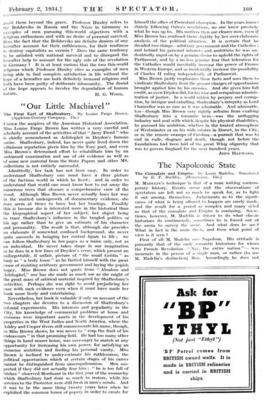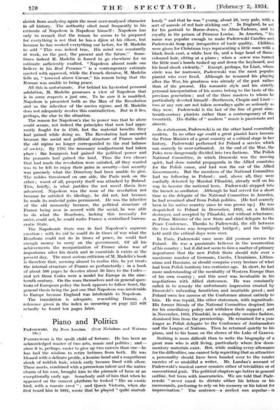The Napoleonic State
M. MADELIN'S technique is that of a man writing contem- porary history. Events occur and the observations of spectators are left not so much to speak for, as to fight it out among, themselves. Judgements as to the signifi- cance of what is being allowed to happen arc rarely made, and the result for a period as complex and many si‘led as that of the consulate and Empire is confusing. Soz times, however, M. Maddin is driven to do what classic historians do continuously, sometimes he is forced out of the arena to survey the scene. And what does he see? What in fact is the main thesis, and from what point of view is it seen ?
First of all M. Madclin sees Napoleon. His attitude is primarily that of the early romantic historians for whom the French Revolution—" Nay, the entire nation "— was incarnate in the person of a single man, or rather (to use M. Aladdin's distinction) Man. Accordingly he does not shrink from analysing again the most over-analysed character in all history. The authority cited most frequently in his estimate of Napoleon is Napoleon himself ; Napoleon has only to remark that the reason he seems to be prepared for everything is not that he has a djinn at his elbow, but because he has worked everything out before, for M. Madan to add "This was indeed true. His mind was constantly at work, on the past, the present and the future." Some- times indeed M. Madelin is forced to go elsewhere for an estimate sufficiently exalted. "Napoleon almost made one believe in his Real Presence" is a contemporary estimate quoted with approval, while the French dictator, M. Madelin tells us, "towered above Caesar," his reason being that the Roman was unable to bring peace.
All this is unfortunate. For behind his hysterical personal adulation, M. Madelin possesses a view of Napoleon that is in some respects a just one. To be sure it is muddled. Napoleon is presented both as the Man of the Revolution and as the inheritor of the ancien regime, and M. Madelin does not adequately resolve this contradiction. But in it lies, perhaps, the clue to the situation.
The reason for Napoleon's rise to power was that he alone could secure, not indeed the principles that men had appa- rently fought for in 1789, but the material benefits they had gained while doing so. The Revolution had occurred because the social and political structure of France under the old regime no longer corresponded to the real balance of society. By 1795 the necessary readjustment had taken place : the bourgeois had gained the political power and the peasants had gained the land. Thus the two classes that had made the revolution were satisfied, all they wanted was to be left to enjoy their gains in security—but security was precisely what the Directory had been unable to give. The nobles threatened on one side, the Paris mob on the other ; worst of all, property itself was attacked by Babeuf. This, briefly, is what justifies the not novel thesis here advanced. Napoleon was the man of the revolution not because he satisfied its ideology, he did not, but because he made its material gains permanent. He was the inheritor of the old monarchy because, the political structure of France being now in accord with the social, he was able to do what the Bourbons, lacking this necessity for order, could not, he could make France a centralized bureau- cratic State.
• The Napoleonic State was in _fact Napoleon's supreme creation : with its aid he could do in times of war what the Bourbons could not do in times of peace, he could find enough money to carry on the government. Of all his achievements the reorganization of France alone was of importance after his death and in essentials it exists at the present day. The most serious criticism of M. Madelin's book is therefore that, seeming almost to realize this, he yet treats the internal structure of France so perfunctorily : in a book of about 500 pages he devotes about 30 lines to the Codes— and yet those Codes were a model for Europe in the nine- teenth century. On the wars themselves and on general ques- tions of European policy the book appears to follow Sorel, the general thesis being the just one that Napoleon was intolerable to Europe because England was intolerable to Napoleon.
The translation is adequate, resembling Dumas. A reference givexi in the index as occurring on page 225 will actually be found ten pages later.









































 Previous page
Previous page